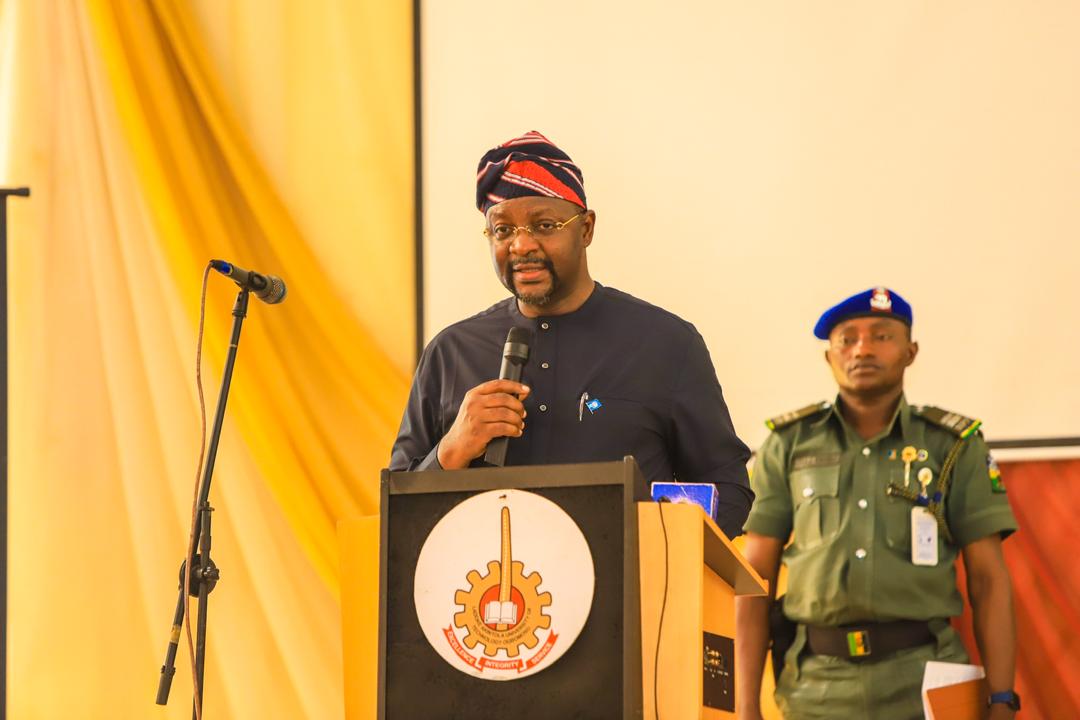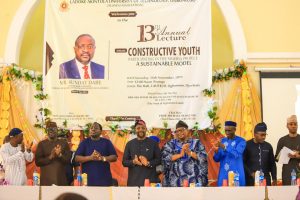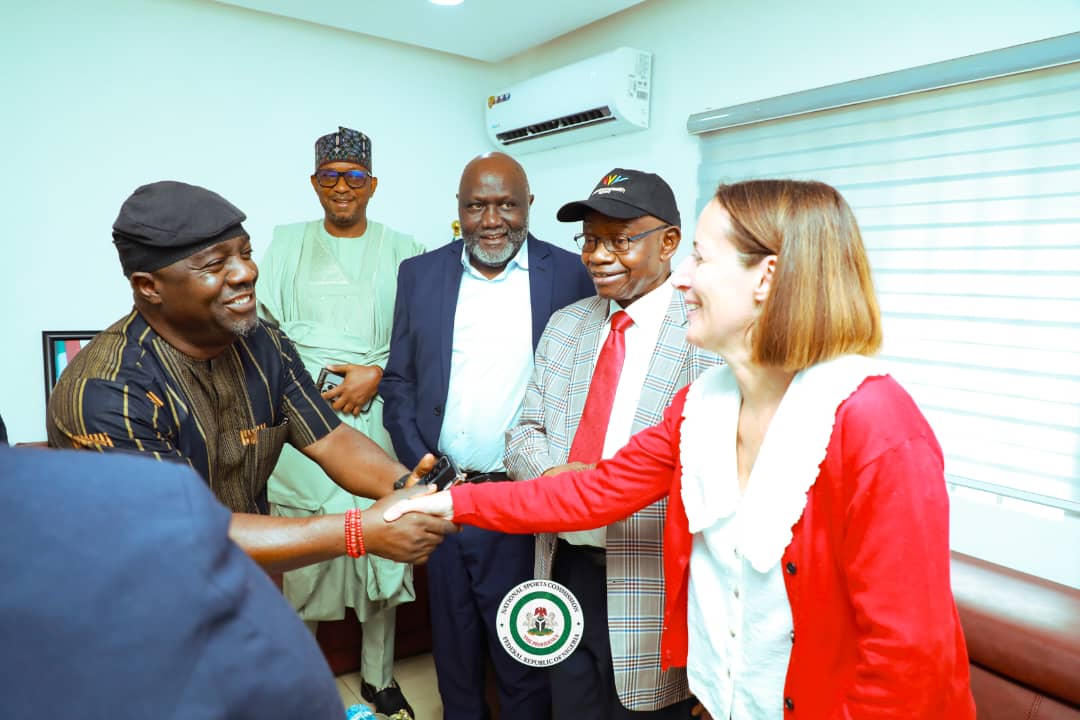Featured
Youth Strategic to the Nigerian Project – Minister

Joel Ajayi
The Minister of Youth and Sports Development, Mr. Sunday Dare has said that Nigeria will in the coming years will rely more on its youth population as a resource, which makes it imperative to increase investment in their development as the Nigerian Project.M

Ministerg this revelation while delivering a lecture titled “Constructive Youth Partnership In The Nigerian Project: A Sustainable Model” at the 13th Annual Lecture of the Alumni Association Of Ladoke Akintola University of Technology (LAUTECH), Ogbomosho – Oyo State.
According to him, the youth will be strategic to developing smart products and solutions to conquer the challenges and problems of climate change, economic slowdown, unemployment and poverty.

“The massive potential of the Nigerian youth bulge is globally recognized. With a growth rate of 3.5 % per annum this segment represents the fastest growing in the world and will effectively dominate the society completely within the next two decades providing the human resource for critical aspects of the Nigerian state.”
While calling on the Nigerian Youth to understand and own the Nigerian Project, he also called for the engagement, mobilization and empowerment of young people. “All around the world, young people are contributing positively to the development of their communities, demonstrating daily that youth is not a problem to be solved but a resource to be harnessed. Nigeria parades a hugely resourceful and talented youth population”, he said.
On his proposals to achieve the Nigerian Project, he reiterated the importance of starting early, stressing that “Sowing the seed of the Nigerian dream will not be at the University level. It must start from childhood because it is at this point that children develop a mental image of who or what they want to become in life. The picture or image they need added to theirs is that of a country which can propel them to achieving that dream.”
Calling for a rebranding of the nation, he said, “we must rebrand Nigeria and communicate it in the right way. In rebranding, we must create a deliberate image of the Nigeria we want our young people to invest in; and then take deliberate steps to make that Nigeria work. For instance, if we want a Nigeria that supports innovative ideas, we must put structures in place that helps innovative ideas to flourish irrespective of the person’s gender, political leaning, religion or ethnic affiliation. There must be a transparent system that gives everyone equal opportunities.
That way, young people with ideas will begin to have hope in the Nigerian project, will flourish and invest in birthing creative or innovative ideas that will catapult the country on the path of massive national development.
“There is need to reposition the mental reasoning of our youth and economically empower them to satisfy the demands of the modern world. Rebranding Nigeria is one of the veritable tools to achieve this objective. Unless rebranding directs the power and energy of the youth towards academic and productive goals, the country will keep on experiencing social vices, moral and academic degradation.” The minister cautioned.
Highlighting the role of ICT in re-branding the country, he said, “it is a peculiar one because ICT is a veritable tool for fast and effective mass communication. The impact of ICT in the world today is far reaching and pervades all boundaries and cultural differences. For effective re-branding all components of ICT and at all levels must be deployed in enlightening, training, and encouraging people towards re-branding”.
Harping on the need for a sustainable model, he said, “we must develop strategies to transfer ownership of the Nigerian Project to youth. One of the ways we can do this is through the Concept of Social Businesses. The underlying value to communicate is CARE. Youth must see that Nigeria is a country that CARES for them and for the things that matter to them. And that there is a system of harnessing and redistributing the opportunities for this CARE.
Social and economic entrepreneurship holds special promise for helping to sustain the rebuilding of the Nigerian Project. They have the potential to play significant roles in developing technologies that can help mobilize and engage young people in the rebuilding efforts”.
He further called for a de-emphasizing of the dividing factors in the country especially on official documents. “Majority of our youth are millennia. They live most of their lives on the internet, which has broken down boundaries and miniaturized the world into one huge space. Communities are no longer physical entities defined by geographical boundaries but are more social or professional groupings in the virtual world, joined together by interests that transcend religious, ethnic, or even political divides.
“This means that our youth, who are more citizens of the digital world than they physical world, will connect and interact with themselves irrespective of their physical divides. This effectively gives us a huge opportunity to de-emphasize, and hopefully one day eliminate such divisive identifiers like tribe, religion, LGA, etc. on our official government documents like forms.
“While these data are important variables for statistical purposes, they do little to promote the unity of the country, and more importantly, the Nigerian Project,” he noted.
The Minister while calling for the institution of a reward system that honours and promotes Nigerian values which will invariably speak to the Nigerian Project, said, “we must keep the young people inspired and focused towards the Nigerian Project. One way to do this is by sustaining a reward system with privileges attached to National Honours (like express access at airports, subsidized hotel lodgings for a period, certain volumes of made-in-Nigeria goods for some period, etc. A virtual Hall of Fame for holders of certain national medals, streets named after such individuals, their plagues telling the story behind such naming.
Intimating his audience on the strategy of the Minister of Youth and Sports Development for actualizing the mandate handed to him by President Muhammadu Buhari to keep the youth productively busy, he said, “the next level belongs to the Nigerian youth. Mr. President’s has a new DEEL (D for digital literacy. E for Entrepreneurship. E for Employability. L for Leadership) for the youth; to train and equip Nigerian youth with the skills they need to compete and for national development. The digital revolution offers an unparalleled opportunity to drive a new wave of international economic growth for countries that have hitherto not fully enjoyed the benefits of the global economy.
“Nigeria is committed to raising a new tribe of 500,000 tech savvy youth countrywide in the next 2 years who will expand the frontiers of innovation not just in combating climate change, but in agriculture, medicine, education and biosciences. The Ministry recently launched the Digital Youth Nigeria project, (DY.NG) that will equip our youth with relevant digital skills set and knowledge that will enable them produce digital products, build smart apps and invent tools that will help reverse or slow down the pace of global warming and sustained social economic growth. A collaborative approach between the public and private sector will drive this project.
“History offers us another opportunity to rebuild from the ruins of the past. From oil, history again offers us another resource – the Youth. By 2030, Nigeria’s greatest resource will no longer be oil but it’s Youth. If you doubt go, ask the Asians.
Nigeria must begin to make huge investments in her youth. That should be the true Nigerian project. Bankable investments in education, technology, agriculture and developmental infrastructure that are sustainable. Investments in our youth now, will be a wise investment. That to my mind is the Nigerian Project. And it is sustainable.”
Featured
Nigeria’s Historic Bid for the 2030 Commonwealth Games: A Call for National and Global Support

Joel Ajayi
Nigeria is poised to make history as it seeks to host the Centenary Commonwealth Games in 2030, a monumental opportunity that promises to transform the nation’s economy, infrastructure, and global standing.
More than a sporting spectacle, the Games would serve as a catalyst for development across multiple sectors, leaving behind a legacy of national pride and sustainable growth.
The benefits of hosting the Games extend far beyond the sports arena. Nigeria stands to gain both empirical and non-empirical advantages, with direct, indirect, and induced impacts that will touch every corner of society. Infrastructural development will take center stage, with new facilities such as indoor sports halls, conference centers, and improved road networks reshaping urban landscapes while strengthening the nation’s capacity to host future international events.
Economic growth is another significant dividend. Over 10,000 jobs are expected to be created, spanning construction, facility management, event planning, and tourism services.
The hospitality industry will undergo major improvements as hotels and resorts are upgraded to meet international standards, while local restaurants, lounges, and tourist attractions will see a surge in patronage from international visitors. Small and medium enterprises, particularly in the transport, finance, and food service sectors, will become some of the greatest beneficiaries, as the Games generate new demand and expand opportunities for local businesses.
The Commonwealth Games will also accelerate the growth of Nigeria’s sports industry.
Investments in training facilities, coaching, and talent development will inspire a new generation of athletes, ensuring long-term benefits that extend beyond 2030, a major focus of the President Bola Tinubu administration.
At the same time, the process of preparing for the Games will create opportunities for Nigerians to learn new crafts, acquire technical skills, and engage in global-standard event management, thereby strengthening human capacity and innovation across industries.
Mallam Shehu Dikko, Chairman of the Nigeria Sports Commission, and Hon. Bukola Olopade, the Director General, have been widely recognized for their tireless and visionary leadership in repositioning Nigeria’s sporting sector.
Their commitment to facilitating infrastructural development and strengthening grassroots sports development has laid the foundation for Nigeria’s bold bid to host the 2030 Commonwealth Games. Under their leadership, the NSC is fostering strategic partnerships and driving innovation in sports administration, they have demonstrated the nation’s readiness to stage an event of such global magnitude.
Beyond the tangible gains, the hosting of the 2030 Commonwealth Games carries profound symbolic value. It would be a moment of unity and pride, a chance for Nigeria to showcase its cultural richness, resilience, and excellence to the world.
As a centenary edition, the Games would stand as a historic milestone not just for the Commonwealth but for Nigeria itself, cementing its place on the global stage as a capable, ambitious, and forward-looking nation.
The gains from hosting the Commonwealth Games can never be undermined or overemphasized. This is Nigeria’s time to step forward and show the world our resilience, and excellence. We call on every Nigerian, across sectors and communities, to support this noble aspiration.
Nigeria’s pursuit of the 2030 Commonwealth Games is a vision for transformation, a blueprint for national development, and a legacy project that will inspire generations to come.
-

 Featured6 years ago
Featured6 years agoLampard Names New Chelsea Manager
-

 Featured5 years ago
Featured5 years agoFG To Extends Lockdown In FCT, Lagos Ogun states For 7days
-

 Featured6 years ago
Featured6 years agoChildren Custody: Court Adjourns Mike Ezuruonye, Wife’s Case To April 7
-

 Featured6 years ago
Featured6 years agoNYSC Dismisses Report Of DG’s Plan To Islamize Benue Orientation Camp
-

 Featured4 years ago
Featured4 years agoTransfer Saga: How Mikel Obi Refused to compensate me After I Linked Him Worth $4m Deal In Kuwait SC – Okafor
-
Sports3 years ago
TINUBU LAMBAST DELE MOMODU
-

 News9 months ago
News9 months agoZulu to Super Eagles B team, President Tinubu is happy with you
-
Featured6 years ago
Board urges FG to establish one-stop rehabilitation centres in 6 geopolitical zones
